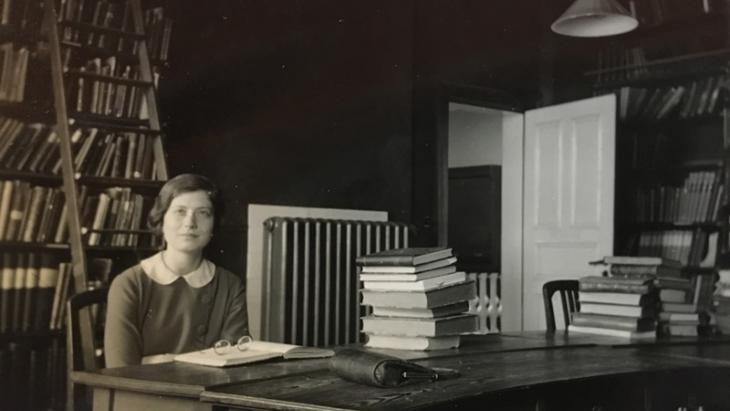European Diary 19.2.2021: 110 years ago today, Hedwig Klein was born in Antwerp. Soon after, the family moved to Hamburg.
She loses her father, the merchant Abraham Wolf Klein, when she is not even five years old. He dies as a soldier on the Eastern Front for the German Reich. Hedwig Klein enrolled at the university to study in 1931. Her choices: Islamic Studies, Semitistisk and English Philology. In 1937, her doctoral thesis is written: the critical edition of an Arabic manuscript on early Islamic history. But Jews are no longer allowed to sit for the doctoral examination from the spring of 1937.
Hedwig Klein is persistent, she convinces the university administration to allow an exception. Her thesis is given the top grade of “Excellent,” and her supervisor Arthur Schaade attests to her “a degree of diligence and perspicacity that one would wish on many an older Arabist.”

Hedwig Klein
In 1938, the thesis is to be printed, and the doctoral certificate is also already drawn up, but then the imprimatur is withdrawn. The ban on Jews earning doctorates is now enforced with all thoroughness.
Now Hedwig Klein plans her emigration. But she does not succeed in obtaining a visa, neither in France nor in the USA. With the help of the Hamburg economic geographer Carl August Rathjens, she finally receives an invitation from an Arabic professor in Bombay. And on August 19, her steamer sets sail from Hamburg. Two days later, she writes Rathjen a hopeful postcard. “Allah will help already…”
But in Antwerp, the ship receives orders to return and call at a German port. By then the German invasion of Poland is already in preparation, and with it the next world war.
Once again, Arthur Schaade helps her. Klein is recommended to Hans Wehr, an Arabist who has just joined the NSDAP. The Reich government, Wehr demands, should make “the Arabs” its allies, against France and England, and against the Jews in Palestine. And the Foreign Office, in turn, sees in Hans Wehr the right man to compile a German-Arabic dictionary. For this is now urgently needed, not least for a successful translation of “Mein Kampf” into Arabic.
Her collaboration on the German-Arabic dictionary initially saves Hedwig Klein from deportation to Riga in December 1941, which Schaade is just able to prevent with an intervention. Klein was irreplaceable.
But on July 11, 1942, the time had come. The first deportation train leading from Hamburg directly to the Auschwitz extermination camp also takes Hedwig Klein to her murderers. Just as her sister, her mother and her grandmother are murdered.
In 1947, Carl August Rathjen succeeds in getting Hedwig Klein’s dissertation printed after all, and she is declared a doctor of philosophy in “absentia”.
After the war, Hans Wehr was classified as a mitläufer and used Klein’s collaboration to exonerate himself. The German-Arabic dictionary appears in 1952, and in the preface Wehr thanks a “Fräulein Dr. H. Klein” for her cooperation. Without a word about her fate.
“Der Wehr” is still the most widely used German-Arabic dictionary, with the 5th edition last published in 2011.
Thanks to Stefan Buchen, who vividly describes Hedwig Klein’s story in his essay on the Quantara.de website.
https://en.qantara.de/content/hedwig-klein-and-mein-kampf-the-unknown-arabist
Flashback, 19.2.2020: In Hanau, Hesse, a 43-year-old German shoots nine people of “foreign origin,” in two shisha bars and on the open street, and injures six others, some seriously. Finally, he shoots his mother and himself at home. Before the attack, the perpetrator had spread a right-wing extremist appeal on the Internet, characterized by anti-Semitic, Islamophobic, misogynistic and racist conspiracy theories: a “message to the entire German people.”
The perpetrator apparently also had psychological problems, which later prompted representatives of the right-wing AFD to deny that the crime was politically motivated. Josef Schuster, the representative of the Central Council of Jews in Germany, on the other hand, states that it can be “assumed that the perpetrator deliberately wanted to hit people with an immigrant background” and accuses the police and judiciary of having “poor eyesight” in the “right eye. Among the victims of the attack are Germans with Turkish, Kurdish, Bosnian and Afghan background, German and Romanian Roma. The perpetrator attacked them all deliberately, or shot them blindly through the door of a shisha bar.
